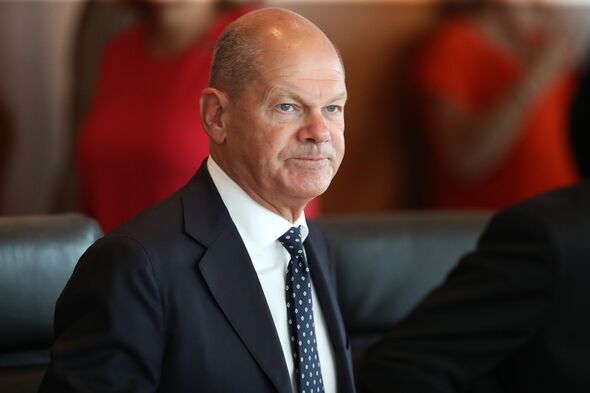German Chancellor Olaf Scholz is working on a peace plan that would include “territorial concessions” to Russia. The secretive plan to end the war in Ukraine comes as Berlin increasingly tries to pressure Ukraine into ending the war with Russia.
However, it is thought that Chancellor Scholz’s new peace plan is an attempt to save his political career, amid speculation that he could be forced to resign by the end of the month.
The peace plan, first reported in Italy’s La Repubblica, would force Ukraine to give up land to Russia as it “does not rule out the transfer of part of Ukrainian territory to Moscow.”
Ukraine has repeatedly and categorically rejected any possibility of territorial concessions and demands the complete withdrawal of Russian troops.
Andriy Yermak, who is the head of Volodymyr Zelensky‘s presidential office, quickly shot down the plan on X, posting: “Only the Ukrainian Peace Formula, international law norms, territorial integrity, and Ukraine’s sovereignty. This is the only path to justice.”
Meanwhile, Russia insists that peace is only possible if Moscow can keep control over the Donetsk, Luhansk, Kherson and Zaporizhia regions. Moscow also demands the lifting of Western sanctions.
The peace plan, which appears to favour Russian claims, could be part of the German leader’s attempt to shore up support among voters, according to critics who claim Chancellor Scholz is simply bowing to pressure following last week’s humiliating electoral defeats.
All three parties in his centre-left coalition suffered devastating losses in two regional state elections, Saxony and Thuringia, last week, while groups seeking better relations with Moscow won more votes.
Nationalist party Alternative for Germany (AfD) and new anti-establishment party BSW, who oppose military aid for Ukraine, both secured record gains.
La Repubblica wrote: “Stunned by the disastrous election results in Thuringia and in Saxony, as well as being haunted by rumours that defeat in the upcoming elections in Brandenburg could force him to resign, the Chancellor decided to play the Ukrainian card, trying to get out of the corner into which he was driven.”
A source within the ruling SPD said that “the chancellor wants to bend Ukraine at any cost”.
Chancellor Scholz has not publicly commented on the peace plan but he did tell broadcaster ZDF that renewed peace talks between the two sides were needed. He said that “the moment has come to discuss how to come to peace”.
He confirmed that he had talked with Ukrainian President Volodymyr Zelensky and that they had both agreed on the need for a new peace conference that would also include Russia.
The main opposition party, the CDU, has criticised the proposal to invite Russia to the next peace summit.
Bundestag member Roderich Kiesewetter said: “The chancellor’s move was predictable, as it fits into the strategy of a part of the SPD to subtly push Ukraine towards a fictitious world defined by Russia, in which support is gradually decreasing and fictitious negotiations are needed instead.
“Scholz wants to portray himself as a chancellor of peace, but at the same time he is worsening the situation in Ukraine and thus weakening the security of Europe and Germany.”
Meanwhile, Ukrainian President Zelensky has pledged to unveil his country’s own peace plan in November, after first discussing it with US leader Joe Biden.
